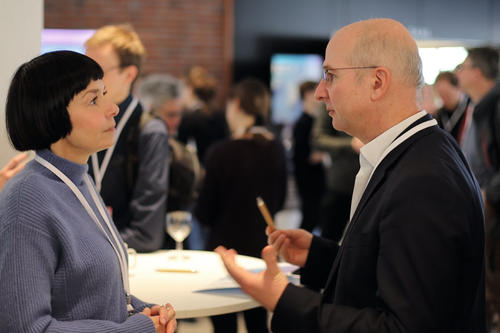"It makes a big difference whether a student contributes their perspective on a topic or a professor"
Discussion – an important element of transdisciplinary exchange
Image Credit: FREIHEIT Gruppe Interdisziplinäre Medienproduktion GmbH
Prof. Dr.-Ing. Christine Ahrend heads the Chair of Integrated Transport Planning at Technische Universität Berlin. As an expert in transdisciplinary research, she contributes her knowledge to the BUA's Steering Committee for "Knowledge Exchange" to promote the mutual exchange of knowledge from the sciences and various sectors of society. Together with the BUA team of the objectives "Focusing on Grand Challenges" and "Fostering Knowledge Exchange", the concept for the participatory topic identification for the Next Grand Challenge has been developed.
Prof. Ahrend, we observe that the number of participation formats between science and civil society is growing. Why is civil society knowledge important for research?
The collaboration between society and science is referred to as a transdisciplinary research mode. We have achieved an enormous depth of expertise in the scientific disciplines but this expertise alone is not enough to address the pressing challenges of our time, such as climate change, digitalization or global health. These challenges additionally require concrete practical and operational knowledge to enable societal change. This is where transdisciplinary research comes in. It enables both scientific knowledge gain and implementation-oriented problem solving by bringing scientific and social stakeholders together. They identify the epistemological problem, formulate research questions, and agree on how to work together to arrive at new insights and concrete solutions. Transdisciplinarity is therefore more than the selective participation of citizens in research projects, it is a new understanding of how to deal with knowledge and make decisions.
What happens when science meets Berlin's urban society?
We were able to observe this well in the topic identification process of the Next Grand Challenge. It makes a big difference whether a student contributes their perspective on a topic or a professor who has been researching in their discipline for decades. The knowledge of the two is based on different previous experiences, which makes one no less valuable than the other. Research should not be isolated from urban society in an ivory tower. It should actively include other perspectives. We have received feedback from many civil society stakeholders about how happy they are to be heard on a level playing field and to contribute their perspectives alongside real scholars and scientists. Many scholars and scientists, in turn, found the perspectives of social stakeholders enriching. Both sides benefit from this exchange.
Participation is not a matter of course. How do you get people to participate?
Often already, by basically acknowledging and welcoming the relevance of their perspective. Many people wonder to what extent they can contribute anything of value at all. It is important to show people the value of their practical experience in the field and why they can have an impact on future research. Many are happy to hear this, especially young people who feel that they are not heard enough by the older generation. That is why the youth participation process of the Next Grand Challenge was so important, because it allowed us to give young people the opportunity to have their voices heard as equals in a direct exchange with scholars and scientists. For other people, for example from organized civil society, it is also about making new contacts, for example for future projects or the like. In principle, the following always applies in any participation process: Barriers to participation must be kept low. That is why, for example, we have paid young people an expense allowance, as is also customary in other participation processes. So, young people with part-time jobs do not have to suffer financially from sacrificing their free time and then not being able to work on that day.
When is transdisciplinary research successful?
Transdisciplinary research is successful when the result of collaboration between urban society and scholars and scientists means that knowledge from urban society also has a real impact on research and thus on solving today's problems. Participation only for the sake of participation does not advance us as a society, as the stakeholders involved are frustrated that they have invested their time but do not feel a direct impact. That is why it is so important to keep explaining the benefits of mutual exchange to everyone involved. And then to follow up the new experiences with real action.

